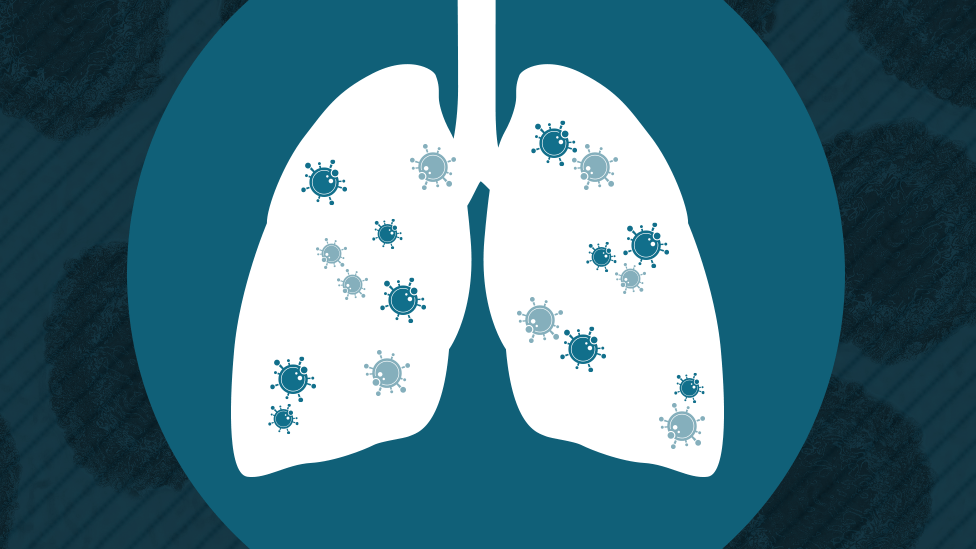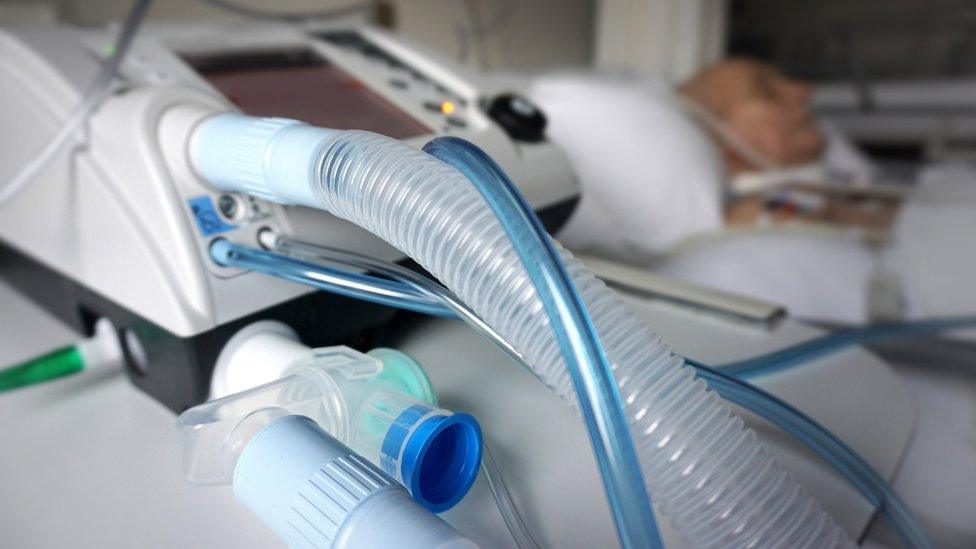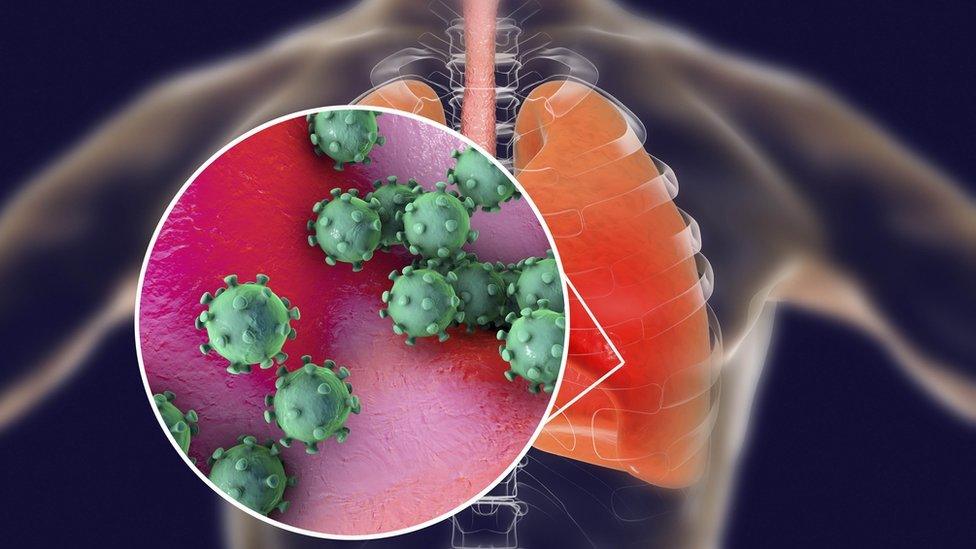Coronavirus: PM says everyone should avoid office, pubs and travelling
- Published
Boris Johnson: "It look as though we are now approaching the fast growth part of the upward curve"
The PM has said everyone in the UK should avoid "non-essential" travel and contact with others to curb coronavirus - as the country's death toll hit 55.
Boris Johnson said people should work from home where possible as part of a range of stringent new measures.
Pregnant women, people over the age of 70 and those with certain health conditions should consider the advice "particularly important", he said.
People in at-risk groups will be asked within days to stay home for 12 weeks.
More than 1,500 people have tested positive for the virus in the UK - but the actual number of cases is estimated to be between 35,000 and 50,000.
Everyone should avoid gatherings and crowded places, such as pubs, clubs and theatres
Everyone should work from home if they can
All "unnecessary" visits to friends and relatives in care homes should cease
People should only use the NHS "where we really need to" - and can reduce the burden on workers by getting advice on the NHS website, external where possible
By next weekend, those with the most serious health conditions must be "largely shielded from social contact for around 12 weeks"
The UK is now "three weeks" behind Italy - the worst-hit country in Europe
If one person in any household has a persistent cough or fever, everyone living there must stay at home for 14 days
Those people should, if possible, avoid leaving the house "even to buy food or essentials" - but they may leave the house "for exercise and, in that case, at a safe distance from others"
Schools will not be closed for the moment
Chief medical adviser Prof Chris Whitty said the group of people who should take "particular care to minimise their social contact" were:
People over the age of 70
Other adults who would normally be advised to have the flu vaccine (such as those with chronic diseases)
Pregnant women
Mr Johnson said "drastic action" was needed as the UK approaches "the fast growth part of the upward curve" in the number of cases. He told Londoners to pay special attention to the advice as the virus is spreading more rapidly in the capital than elsewhere.
Health Secretary Matt Hancock told the House of Commons the number of people to have died with the virus in England had risen to 53 - and "the disease is now accelerating".
The first death in Wales, and a death in Scotland, brings the total number of deaths in the UK to 55.

Why has the UK plan ramped up?

The UK's plan has shifted because the scientific modelling showed we were on course for a "catastrophic epidemic".
A strategy of just slowing the spread of the virus, but not trying to stop it, would have overwhelmed intensive care units.
The modelling by Imperial College London, external has been heavily informed by the experience in Italy and is influencing decisions at the heart of government.
Its calculations predicted 260,000 deaths in the UK.
Instead the plan is to drive down the number of cases to very low levels, which the models predict will limit deaths from coronavirus to the thousands or tens of thousands.
However, this approach comes with a major problem - there is no exit strategy.
Without the immunity that would build up if people were infected, then cases would soar as soon as measures are lifted.
The report said these could need to be in place until a vaccine is available, which could take up to 18 months.
We are in this for the long haul.

"We are in a war against an invisible killer," Mr Hancock said, adding that emergency legislation to tackle the virus would be introduced to Parliament on Thursday.
Some legislation will pass through the Commons unopposed this week as MPs feel the pressure to tackle coronavirus.
Sir Patrick Vallance, the UK's chief scientific adviser, said further measures such as closing schools may be necessary at some point.
"Those things need to be done at the right time," he said.
'Fast upswing' in cases
The total number of people in the UK to test positive for the virus has risen by 171 in a day to a total of 1,543, according to the latest Department of Health figures, external. The latest cases include 30 more from Wales and 18 in Scotland.
Sir Patrick said the UK is now "three weeks" behind Italy.
Italy, the worst-affected nation outside China - where the virus originated - has more than 20,000 cases and has suffered more than 1,800 deaths.
Sir Patrick added: "It looks like we're on the fast upswing or just about to get there and that's the reason to want to get in quite quickly with these measures."
Prof Whitty: "People who do this...are doing things to protect the NHS."
However, Prof Whitty added that the chance of dying with the virus "for any individual person" was "very low".
Most of those who have died in the UK have been people over the age of 60 with underlying health conditions.
Whole households to stay at home
Prof Whitty said if one person in any household starts to display symptoms, everyone living there must stay at home for 14 days.
Mr Johnson said the stay at home advice means people should, if possible, avoid leaving the house "even to buy food or essentials".
He said people could leave home to do exercise but should do so at a safe distance from others.
Prof Whitty said social restrictions would be "very difficult for people to maintain" but they would be "doing it to protect the NHS from being overwhelmed".
All non-essential public access to the Houses of Parliament will be stopped in response to the virus.
Commons Speaker Sir Hoyle urged MPs and peers to heed the latest advice.
But Labour leader Jeremy Corbyn criticised the government's communication strategy and lack of support for low wage citizens. He said, despite being 70, he would not follow any advice to self-isolate.

EASY STEPS: How to keep safe
A SIMPLE GUIDE: What are the symptoms?
TRAVEL PLANS: What are your rights?
IN-DEPTH: Coronavirus pandemic

Industries angry at 'uncertainty and confusion'
Theatres and music venues around the UK, including the National Theatre, London Palladium and Royal Opera House, have announced they are to close from Monday night until further notice after the prime minister said people should avoid such locations.
Ticket-holders will be contacted about obtaining refunds but as many venues are charitable enterprises, people are being encouraged to donate the cost to show their support.
The British Beer and Pub Association said coronavirus was having a "devastating" effect on pubs.
"The government needs to give clear instructions and detail on the support package to rescue the sector and hundreds of thousands of jobs," chief executive Emma McClarkin said.
Many have expressed anger that Mr Johnson advised people to stay away from "pubs, clubs, theatres and other such social venues" while not forcing premises to close, which could have given them financial protection.
Actor Idris Elba confirmed on Twitter, external he had tested positive for the virus.
And further sporting events have been suspended, including Football's National League and Rugby Union's premiership, while events such as the Grand National, Boat Race and Isle of Mann TT races have been cancelled.
Mr Johnson said the risk of transmission of the disease at sporting events was relatively low, "but obviously, logically, as we advise against unnecessary social contact of all kinds, it's right that we should extend that advice to mass gatherings as well".
Meanwhile, head teacher leaders have warned that keeping schools open as growing numbers of staff have to self-isolate is the most pressing challenge they face. The government policy remains schools should stay open although closures may be necessary "at the right stage" of the outbreak.
The prime minister said the economy would take a short-term hit from the pandemic, but should come "roaring back" as the disease declines.
But global stock markets sank again on Monday despite central banks around the world announcing a co-ordinated effort to ease the effects of the virus.
Tests to be 'scaled up'
More than 44,000 people in the UK have been tested for the virus.
People self-isolating with mild symptoms are no longer being tested - the government has said, external tests are primarily being given to hospital patients with respiratory problems, and to people in residential or care facilities experiencing outbreaks.
But on Monday the head of the World Health Organization, Tedros Adhanom Ghebreyesus, said not enough tests were being carried out.
"We have a simple message for all countries: test, test, test," he said - adding that the WHO has sent out almost 1.5 million tests to 120 countries.
Prof Whitty defended the UK's testing regime but said: "We do intend to continue to scale up testing."
He said tests only reveal whether or not people are currently sick - and that a test to show whether or not people had previously had the virus would be "transformational".
Public Health England (PHE) was "very rapidly" developing such a test, he added.
What's happening elsewhere?
The lockdown of European countries has continued to expand - Germany and France are the latest to enforce stringent measures
The European Union will close its borders for 30 days from Tuesday to external visitors from non-EU countries, according to French President Emmanuel Macron. But travel with Switzerland and the UK will be preserved
A virus-hit cruise ship stranded in the Bahamas has set sail for Cuba, where 667 British passengers will be flown back to the UK
Travel restrictions and a slump in demand due to the virus have forced airlines to cancel most flights and temporarily reduce staff
In the US, President Trump said people should avoid meeting in groups of more than 10, but that a nationwide quarantine is not yet planned
- Published14 March 2020

- Published16 March 2020

- Published16 March 2020
